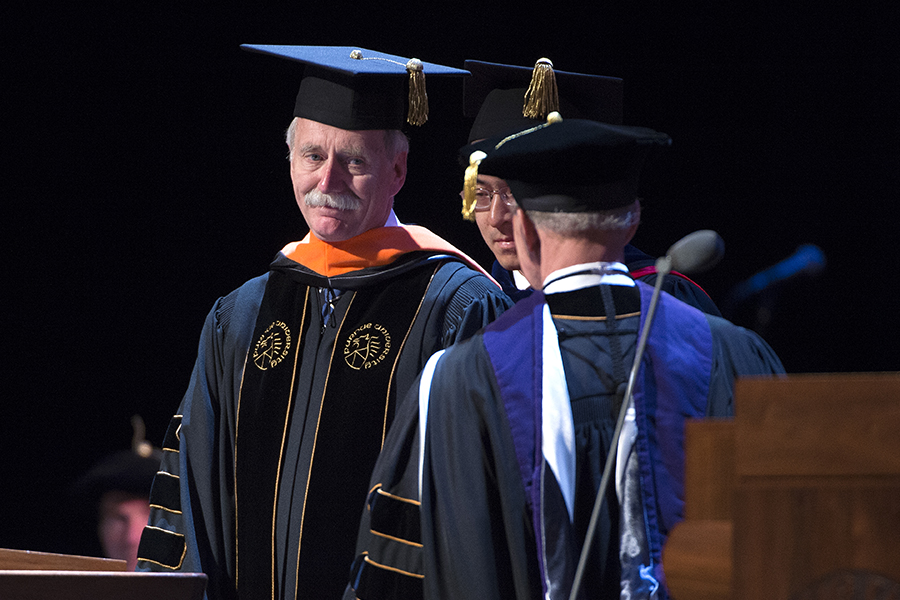Alumnus Gerstenmaier receives Honorary Doctorate

William Gerstenmaier ran out of time.
In 1992, Gerstenmaier received a fellowship from NASA to pursue a doctorate at Purdue. It was 15 years after earning his bachelor’s degree in aeronautical and astronautical engineering from the university and more than 10 after receiving his master’s from the University of Toledo. Gerstenmaier, admittedly, was rusty.
“A lot of skills had atrophied, and I didn’t realize how much I didn’t know. So it was a really humbling experience to come back to school,” he said. “I had to pull out old textbooks and reteach myself.”
With the caveat that he’d be on leave from his NASA duties for only one year, Gerstenmaier packed all of the coursework into 1992-93. Then, he learned he could stay another year while the agency was in the middle of the International Space Station redesign. So Gerstenmaier got in another year of light coursework and prepared for qualifiers.
But then it was time to return to NASA. And Gerstenmaier didn’t have his Ph.D.
His major professor wanted him to write and publish papers, but Gerstenmaier returned to a management job at Johnson Space Center in Houston. His time spent building software for the control center was very different than his research in dynamics and controls at Purdue. As a result, he never finished the dissertation and research.
“I don’t regret it at all,” he said. “I got retooled again. I got to learn what things were like. It really helped me when I went back to JSC because I could do things my employees couldn’t even do in terms of some coding and algorithms. So it was excellent.”
Gerstenmaier got nearly everything out of the experience except the degree.
Purdue remedied that in May.
Gerstenmaier was presented an honorary doctorate by President Mitch Daniels at Spring Commencement for his accomplishments as one of NASA’s most influential leaders and administrators. Gerstenmaier currently is the associate administrator for the Human Exploration and Operations Mission Directorate at NASA Headquarters, and he’s been with the agency for more than 40 years.
Gerstenmaier called the HDR a “tremendous honor.”
“I feel really privileged to be honored in this way,” he said. “I think the business that I’m in, human spaceflight and spaceflight in general, is really hard and really complicated, and it’s not really any one individual that makes that work. It’s really a team. I have a tremendous team behind me that supports me every day in a variety of different ways. It’s nice that I get recognized, but I also think of all the folks who have really helped along the way. Even back to Purdue, some of the professors I had. Some of the folks even back in junior high and high school, teachers I’ve had that have really shaped where I am today.”
“So when I think about this, I’m honored that I’m recognized, but then I think about all the others who have helped me to get this recognition.”
Gerstenmaier started at NASA in 1977 performing aeronautical research at the Cleveland facility. He headed to JSC in 1980 and worked on the first 18 Space Shuttle flights as a propulsion flight controller. In 1988, he was asked to lead the Orbital Maneuvering Vehicle Operations Office. Then, he moved to the Space Shuttle/Space Station Freedom Assembly Operations Office before serving as Shuttle/Mir Program operations manager. In 1998, he was named manager of Space Shuttle Program Integration. In 2000, he was named deputy manager of the ISS Program. Two years later, he became manager. In 2005, he moved into his current role as associate administrator for the Space Operations Directorate.
Along the way, Gerstenmaier has served at the pleasure of a variety of administrators and administrations, seen the commitment to human spaceflight ebb and flow, weathered programs being shut down, and mourned the loss of friends in the Challenger and Columbia tragedies.
Through it all, he has been able to bring a stability to the agency, especially the last 14 years in a role that essentially means he’s responsible for human spaceflight all over the world.
“I tried to keep the momentum moving in a constant direction that got us toward the goal,” he said. “My goal is really moving human presence into the solar system and keeping a human presence in space. I liken it sometimes to sailing where you know where you’re going on the other shore, but the wind is maybe directly in your face, so you tack right for a while; it doesn’t look like you’re making much progress, so you tack left for a while. But you know where you’re going. As long as you’re doing that, you’re still making progress toward your goal. It may not be as fast as you want, but it’s there. I think I’ve helped kind of guide that plan.”
And he doesn’t intend to slow down, especially with the administration’s directive of returning humans to the Moon by 2024. That command has Gerstenmaier energized, in a job that already offered daily challenges, lessons learned, and plenty of awe moments.
“I feel unbelievably blessed to get to do this,” he said. “When I have a bad day, I step back and think about the bigger purpose about what we’re doing, and it just sinks in that I am so blessed to get to do this and work with this unbelievably talented work force. It’s phenomenal.
“What I want to make sure is I’m still pushing hard enough and I’m still driving the team. If the joy of coming to work isn’t there every day — I’m not excited about this and I’m not ready for this challenge or I’m starting to lose the skills to be as sharp as I need to be or I’m losing the energy — it’s time for me to move on. I’m kind of always looking at that, to see am I still able to do this stuff. So far, yes. That’s cool.”
